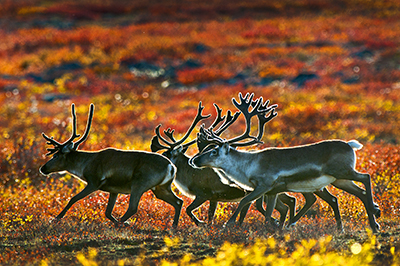
Barren ground caribou herds tend to dramatically cycle in size every 40 to 70 years, and harvest data and related research shows that Indigenous people adapt to those cycles.
There are several reasons why barren ground caribou populations in Canada have declined more than 70 per cent over the past two decades, but too much hunting by Indigenous people is not one of them, new research says.
"There is little to no evidence that harvesting has had any negative effects on wildlife population dynamics in Canada," said Brenda Parlee, lead researcher on a study that sought to unearth the facts around an issue she sees as poorly understood by governments and the public.
Some people assume that Indigenous people will overhunt natural resources key to their cultures, economies and health unless central governments are involved, said Parlee.
"You can see this kind of storyline in newspaper headlines in various parts of the country; such assumptions have also led to expensive and time-consuming processes of harvest management (restrictions to hunting) in Northern Canada and elsewhere in the country."
Parlee and her colleagues argue that these assumptions are based on anecdote and not evidence.
Barren ground caribou in northern Canada is a very well-studied species and one that is highly valued and harvested by First Nations and Inuit peoples, said Parlee, an associate professor in the Department of Resource Economics and Environmental Sociology.
Their herds tend to dramatically cycle in size every 40 to 70 years, and harvest data and related research shows that Indigenous people adapt to those cycles, she said.
Parlee's team analyzed 13 years of harvest data collected by governments in the Northwest Territories, which showed strong parallels in caribou population and harvest numbers (as caribou populations dropped, communities harvested fewer caribou). As well, the research synthesized 30 years of human health studies, which show similar steep declines in traditional food consumption across Canada, including in the North.
All evidence points to Indigenous people being very good stewards of resources integral to their food security and economies, said Parlee.
"Most communities in the North are respectfully participating in harvest management planning with the aim of doing their part to protect caribou," said Parlee. "But time, attention and resources could be better spent."
Traditional knowledge and scientific research indicates there are a variety of other factors that drive changes in populations of barren-ground caribou.
"There is a lot of evidence that human disturbance of habitat from mining, and oil and gas activity is a critical problem," said Parlee.
"Indigenous communities living in the Bathurst caribou range will be the first to tell you the Bathurst caribou herd has undergone a dramatic population crash that coincides with a dramatic increase in mining development."
Parlee suggests current government policies that restrict harvesting but allow for increasing mining and oil and gas activity are putting both caribou and northern communities at risk.
"It's a problem that compounds," she said. "Mining exploration and development is increasing stress on caribou and restricting subsistence harvesting of caribou creates problems of food insecurity.
The problem is not just limited to northern Canada, she said. "Wildlife conservation decisions need to be based on evidence, not anecdote. It is counter-productive to ignore valuable knowledge from Indigenous people who have sustainably managed their natural resources for thousands of years."
The study, Undermining Subsistence: Barren-Ground Caribou in a 'Tragedy of Open Access is published in Science Advances.